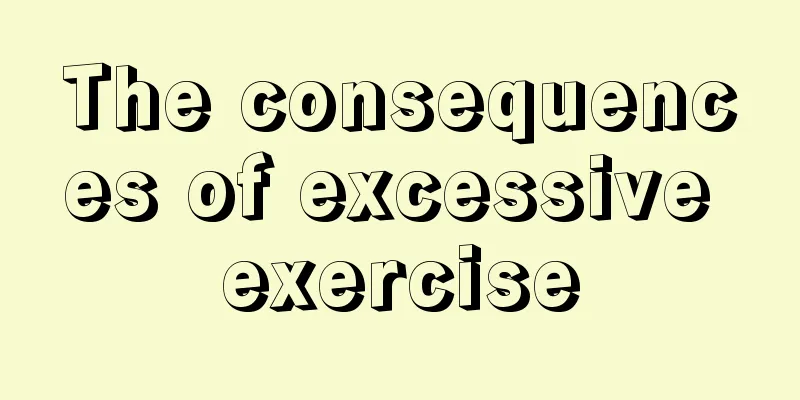The consequences of excessive exercise

|
Studies have shown that an inactive lifestyle can affect human health and longevity as much as a pack of cigarettes a day. Regular physical activity has been found in countless studies to benefit both physical and mental health. Many people have discovered the health benefits of exercise: weight control, muscle strength, staying active, etc. However, regular moderate exercise is more beneficial to the body than high-intensity exercise. So, what are the consequences of over-exercising? 1. Acute renal failure Excessive exercise causes muscle dissolution, and the myoglobin in the muscles will form crystals in the renal tubules, blocking the renal tubules and thus affecting the normal functioning of the kidneys. 2. Anemia In fact, excessive exercise can also cause anemia. The anemia here does not mean that a large amount of blood is lost from the body, but it is medically called "sports anemia." This is because during exercise, the body will sweat a lot. In addition to water, sweat also contains a lot of metal ions, such as iron ions in the blood. The large amount of sweat loss leads to a decrease in iron ions in the blood, thereby causing anemia, so it is also called "iron deficiency anemia." So sometimes when you exercise too much, you often feel dizzy, which is caused by anemia. 3. Impact on endocrine After we have experienced a period of intense exercise, we often feel very tired and don’t want to move, let alone continue exercising. In fact, this phenomenon is caused by endocrine suppression. It is the pituitary gland that usually controls the hormone secretion of our body. When we exercise excessively, the function of the pituitary gland will be inhibited, which will affect the hormone secretion. This will cause physical fatigue, poor physical recovery, and even cramps. 4. Causes dehydration When exercising, due to the increase of adrenaline and the hot summer weather, many people sweat a lot during exercise. The main component of sweat is water. If a large amount of sweat is lost, the body will continue to lose water, resulting in dehydration. Heatstroke often occurs due to dehydration in summer. 5. It can easily cause heart disease When we exercise, the adrenaline secreted by the body causes our heart rate to speed up, so we often feel our heart beating rapidly after exercise. |
<<: How long is the appropriate time for morning exercise?
Recommend
What are the multifunctional strength training equipment?
In our daily life, we usually use comprehensive t...
What is the jogging pace for weight loss?
We often want to exercise in our lives, but maybe...
What are the benefits of practicing yoga?
Most people in life have practiced yoga, and the ...
Is it good to practice yoga in the morning?
Practicing yoga in the morning is very good for t...
How do thin people build muscle?
I believe that many of my thin friends have had t...
Can skipping rope at night help you lose weight?
When jumping rope, most people will pay attention...
Can swimming help you lose weight?
Swimming is a sport that many people are familiar...
How can I do sit-ups quickly in normal times?
Sit-ups are very popular among people and are a r...
How to train the Sichuan-shaped abdominal muscles
Do you know what the "川"-shaped abdomin...
Cooking habits can cause cancer. Are you one of them?
Recently, the article "Four Habits When Cook...
How many of the top ten recognized fat-burning exercises have you tried?
Beauties are always thinking about losing weight....
How to keep exercising?
Exercise is something that many of our friends do...
Can squats really help you lose weight?
I believe that when it comes to weight loss, many...
What are the muscle training exercises?
Scientific and efficient muscle training methods ...
Is belly dancing an aerobic exercise?
Now, as dietary conditions gradually improve, man...









